
"Let's Dance" is the first single from English boy band Five's third studio album, Kingsize (2001). The song was written by Richard Stannard, Julian Gallagher, Ash Howes, Martin Harrington, Abz Love, Jason "J" Brown, and Sean Conlon and produced by Stannard and Gallagher. Released on 13 August 2001, "Let's Dance" charted at number one on the UK Singles Chart, becoming Five's third and final number-one single, and was certified silver by the British Phonographic Industry (BPI). The song also peaked at number two on the Irish Singles Chart and became a top-10 in hit in Australia, Flanders, Greece, and Romania.

"You're Not Alone" is a song written by Tim Kellett and Robin Taylor-Firth and performed by British trip hop group Olive on their debut album, Extra Virgin (1996). First released as a single in August 1996, it found greater success in 1997 in a remixed version, reaching number one on the UK Singles Chart that May. The song has been covered by a number of artists, most notably by German trance DJ and producer ATB in 2002 and Danish singer-songwriter Mads Langer in 2009.
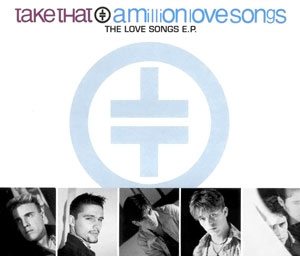
"A Million Love Songs" is a song by English boy band Take That that appeared on their debut studio album, Take That & Party (1992). The song was written by lead vocalist Gary Barlow. It was released in the United Kingdom on 28 September 1992 by Sony Music and peaked at number seven on the UK Singles Chart that October. It also reached number 50 in the Netherlands.

"Swear It Again" is a song by Irish boy band Westlife. The ballad was released on 19 April 1999 in the United Kingdom as the first single from their debut album, Westlife (1999). The song peaked at number one on the UK Singles Chart for two weeks, giving Westlife their first of 14 UK number-one singles. "Swear It Again" is Westlife's only single to have charted in the US, peaking at number 20 on the Billboard Hot 100 and ranking number 75 on the Billboard Hot 100 year-end chart in 2000.

"Pray" is a song by English boy band Take That. Written by band member Gary Barlow, the ballad was released on 5 July 1993 by RCA and BMG as the second single from the band's second studio album, Everything Changes (1993). It is the first of twelve singles by the band to reach number one on the UK Singles Chart, staying at number one for four weeks, and starting a streak of four consecutive number-one singles. The song has received a Gold sales status certification and sold over 438,000 copies in the UK, won British Single of the Year and British Video of the Year at the 1994 Brit Awards, and was the finale of Take That's Beautiful World Tour 2007. The music video for "Pray" was directed by Gregg Masuak and filmed in Mexico.
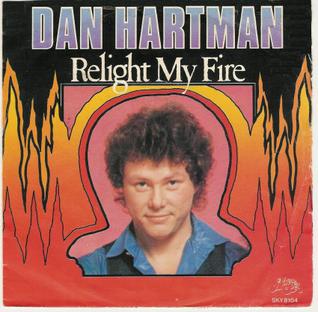
"Relight My Fire" is a disco song written and released by American musician, singer, songwriter, and record producer Dan Hartman as the title track from his 1979 album of the same name. It was also performed by Costa Anadiotis' band Café Society in 1984 and British boy band Take That in 1993, five months before Hartman died.

"Keep On Movin'" is a song by British boy band Five. It was released on 25 October 1999 as the second single from their second studio album, Invincible (1999), and debuted at number one on the UK Singles Chart, becoming Five's first UK number-one single. "Keep On Movin'" was the 36th-biggest-selling single of 1999 in the UK, and in 2023, it received a double-platinum certification from the British Phonographic Industry (BPI) for sales and streaming figures exceeding 1,200,000 units. "Keep On Movin'" also charted within the top 10 in several other countries, including Hungary, where it reached number one.

"Love Won't Wait" is a song by English singer Gary Barlow from his debut studio album, Open Road (1997). It was released as the second single from the album on 9 April 1997 by BMG and RCA Records. The song was written by Madonna and Shep Pettibone, and was an unreleased demo from her Bedtime Stories (1994) studio sessions. Barlow came by the demo in 1997, while looking to record more songs for Open Road. He changed the lyrics to represent a male point of view rather than Madonna's, and recorded the track with Stephen Lipson as producer.

"So Help Me Girl" is a song written by Howard Perdew and Andy Spooner and recorded by American country music singer Joe Diffie. It was released in January 1995 as the third single from his fourth studio album, Third Rock from the Sun (1994). The song reached number two on the Billboard Hot Country Singles & Tracks chart, where it debuted at number 59 for the week of February 4, 1995, and number 84 on the Billboard Hot 100.
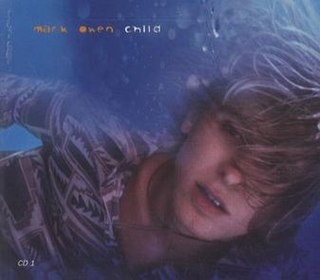
"Child" is the debut solo single of Take That band member Mark Owen, released on 18 November 1996. It was the first single to be released from Owen's debut album, Green Man (1996). He told in an interview, "It was the first song I wrote, and while I was writing the others I always knew it was going to be the first." "Child" peaked at number three on the UK Singles Chart, making it Owen's joint-most-successful single of his solo career. It was certified silver and sold over 200,000 copies. The song reached number one in Lithuania, Spain, and Taiwan and peaked within the top 10 in Austria, Belgium, Czech Republic, Denmark, Ireland, and Switzerland.

"I Love You Always Forever" is the debut single by Welsh singer Donna Lewis from her debut album, Now in a Minute (1996). Written by Lewis and produced by Lewis and Kevin Killen, it was released as the album's lead single in the United States on 16 April 1996 and in the United Kingdom on 26 August 1996. The song is inspired by H. E. Bates' novel Love for Lydia, from which the chorus is taken.
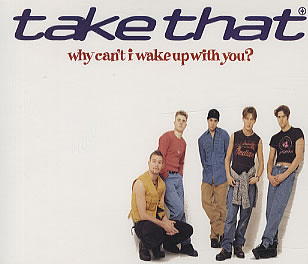
"Why Can't I Wake Up with You" is a song by English boy band Take That. Written by bandmember Gary Barlow, the song was released on 8 February 1993 by RCA and BMG as the lead single from their second album, Everything Changes (1993). The song reached number two on the UK Singles Chart and number seven in Ireland

"Babe" is a song by English boy band Take That, released in December 1993 by RCA and BMG as the fourth single from the band's second album, Everything Changes (1993). Written by bandmember Gary Barlow, it features Mark Owen on lead vocals. Production was led by David Clayton, who later spent 10 years as keyboard player and backing vocalist with Simply Red. Accompanied by a music video directed by Gregg Masuak, the song was a number-one hit in both Ireland and the United Kingdom while peaking within the top 10 in Belgium, Finland, Germany, Israel, Lithuania, the Netherlands, Norway, Sweden and Switzerland.
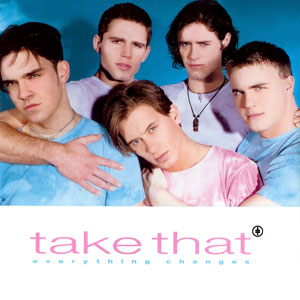
"Everything Changes" is a song by English boy band Take That. Released as the fifth single from the band's second studio album, Everything Changes (1993), and written by Gary Barlow and producers Michael Ward, Eliot Kennedy and Cary Bayliss, the song features Robbie Williams on lead vocals.

"Love Ain't Here Anymore" is a song by English boy band Take That. Released on 27 June 1994 by RCA and BMG, it was the sixth and final single taken from the band's second studio album, Everything Changes (1993). The song peaked at number three in the UK Singles Chart, ending their string of consecutive number-one singles. It failed to overtake Wet Wet Wet's cover of "Love Is All Around" at number one, and American R&B group, All-4-One, who reached number two with "I Swear". "Love Ain't Here Anymore" was re-recorded for release in the United States and included on their first Greatest Hits compilation in 1996.

"Sure" is a single by English boy band Take That, released as the lead single from their third studio album, Nobody Else (1995). It was written by Take That's lead singer Gary Barlow and fellow band members Robbie Williams and Mark Owen. Released on 3 October 1994 by RCA and BMG, the song became the band's fifth number one on the UK Singles Chart and has received a silver disc certification in the UK for selling over 200,000 copies. Q Magazine ranked "Sure" at number 86 in their list of the "1001 Best Songs Ever" in 2003.

"Wherever You Will Go" is the debut single of American band the Calling. The song was released on May 22, 2001, as the first single from their debut studio album, Camino Palmero (2001). It remains their most successful hit, peaking at number five on the US Billboard Hot 100 and topping the Adult Top 40 for 23 weeks, the second-longest-running number one in the chart's history. Outside the United States, the song topped the music charts of Italy, New Zealand, and Poland, reached number three in the United Kingdom, peaked at number five in Australia, and became a top-10 hit in several European countries.

"I Love You" is a song written by Keith Follesé, Adrienne Follesé and Tammy Hyler, and recorded by American country music singer Martina McBride. It was released in July 1999 as the first single from her album Emotion. McBride originally recorded "I Love You" for the 1999 film's soundtrack, Runaway Bride, starring Julia Roberts and Richard Gere. The single was also included on McBride's then-upcoming album Emotion and later appeared on her Greatest Hits compilation album.
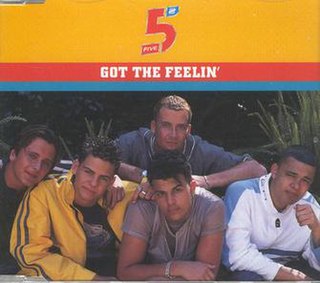
"Got the Feelin'" is a song by English boy band Five. It was released in June 1998 as the third single from their debut studio album, Five (1998). It was written by Richard Stannard, Julian Gallagher, Jason "J" Brown, Sean Conlon, and Abs Breen and produced by Denniz Pop and Jake Schulze. The song became a hit, peaking at No. 3 in the United Kingdom, No. 2 in New Zealand, No. 4 in Ireland, and No. 6 in Australia. It was also successful in several mainland European countries.

"I Wonder Why" is a song by American singer and songwriter Curtis Stigers, released as the first single from his eponymous debut album on August 12, 1991, in the United States. The song reached number four on the Danish and Irish singles charts, number five on the UK Singles Chart, and number nine on the US Billboard Hot 100. It also reached the top 10 in Belgium, Denmark, Germany, the Netherlands, and Norway.




















